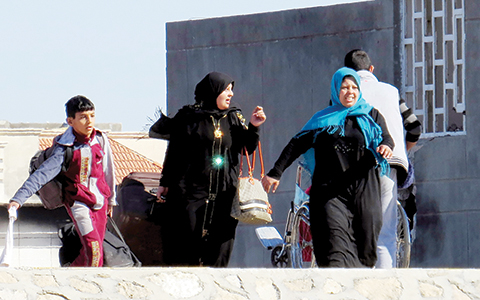By Mai Al-Nakib
Mahmoud Darwish. Ghassan Kanfani. Fawaz Turki. Edward W. Said. Samih Al-Qasim. Fadwa Tuqan. Yasmine Zahran. Emile Habiby. Elias Sanbar. Salwa Salem. Atef Abu Saif. Salim Tamari. Salma Jayyusi. Khaled Juma. Selma Dabbagh. Susan Abulhawa. Naomi Shihab Nye. Deema Shehabi. Ghada Karmi. Mourid Barghouti. Raja Shehadeh. Suad Amiry. Shafeeq Ghabra. Siham Abu-Ghazaleh. Salman Abu Sitta. Steven Salaita. Joseph Masaad. Saree Makdisi. Walid Khalidi. Rashid Khalidi. This is a short list of the Palestinian writers — that is to say, poets, novelists, memoirists, scholars, and academics in every field — who happen to sit on three of my bookshelves dedicated to Palestinian writing. Edward Said alone occupies one of those shelves in its entirety. Many more books by other Palestinian writers are scattered across different shelves in my library, not restricted to those three, mirroring, it suddenly occurs to me, the cruel scattering across the globe that Palestinians have had to endure since the Nakba of 1948. Yet the shelves of my library and every library in the world are a shelter for Palestinian words, if not for the Palestinian people. The dispersal of Palestinian words in books across global shelves is not the same as the diaspora of the Palestinian people post-Nakba. In fact, the former acts as a counterforce against the latter by affirming and articulating Palestinian resilience.
In the face of the utter calamity of the last few weeks — the ethnic cleansing of the Palestinians by Zionist forces, the shameless war crimes committed against Palestinian civilians and their children — the tongue freezes in the mouth. And the mouth refuses to shape the words that would try to make sense of the violence on the ground and the cynical indifference of global leaders. Senseless injustice sticks like a bone in the throat. However, the groundswell of public support that grows around the world for the rights of the Palestinians, for the justice to which they are long overdue, is an outcome, in part, of the words of the Palestinians themselves. Their words have accumulated over seven decades and longer, sometimes heard loudly and to great acclaim, more often ignored but still present and persistent. Word by word, poem by poem, novel by novel, song by song, essay by essay, film by film, study by study — Palestinians have produced an avalanche of cultural and academic works, and through these eloquent expressions, they have established their right to exist in an oblivious world inclined to erase them and their history. Palestinians, like all human beings, should not have to bear the burden of proving their right to exist. And yet, Palestinians have been and continue to be forced to claim that fundamental human right again and again, under threat of annihilation. Persisting against existential annihilation is precisely what Palestinian writing does.
First and foremost, Palestinian writing — whether in the form of poems, novels, essays, or social media posts — is a literature of existence. By the very fact of its existence, despite every effort to snuff it out, Palestinian writing becomes a literature of resistance against colonial violence, dehumanization, injustice, and oppression. But Palestinian writing is much more than a literature of existence and resistance. Palestinian writing has and will continue to prepare the conditions for social and political transformation. In the glaring gap left by unethical leaders and politicians, Palestinian writers have triumphed. So much of the critical vocabulary used today in narratives of decolonization and anti-racist struggle derives from Edward Said’s masterful studies of the 1980s and 90s. And today, on the ground, brave young Palestinian social media activists and journalists are providing corrective narratives with their lucid verbal and visual reports — and paying for it with their lives — even as the most powerful media apparatuses on the planet remain blatantly biased. As a direct result of these reports, we are witnessing a shift in public opinion the world over.
As someone who cares about language more than most other things, I hold Palestinian words especially close. They are the last vestige of our rapidly vanishing humanity. To become worthy of Palestinian words, of Palestinian writing, is what the rest of us must strive to achieve without delay and without fail. The alternative — as we are witnessing before our eyes — is monstrous.











